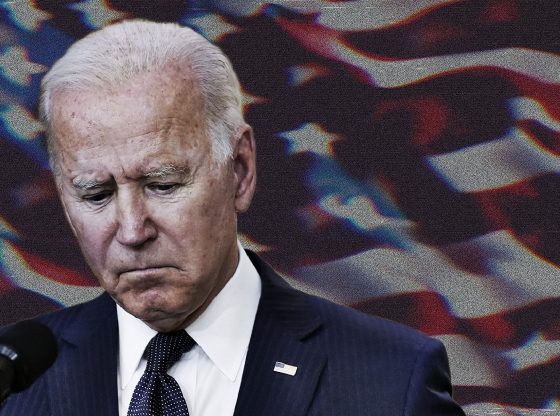Several of the 51 former intelligence officials who signed a letter casting doubt on the authenticity of Hunter Biden’s laptop before the 2020 presidential election are now pushing Congress to enhance the surveillance of Americans, according to a Tuesday letter.
Former Director of National Intelligence James Clapper, former Deputy Director for the National Security Agency (NSA) Richard Ledgett, former Deputy CIA Director Michael Morell, former CIA Chief of Staff Jeremy Bash and former NSA General Counsel Glenn Gerstell signed a letter in 2020 arguing that the leak of documents from Biden’s laptop had the “earmarks of a Russian information operation.” The former officials railed against a bill that would limit intelligence agencies’ ability to surveil Americans without a warrant, while praising a bill that would enable surveillance of any location that provides internet access, according to the recent letter to House lawmakers.
“We cannot hamstring the U.S. Intelligence Community either by failing to renew Section 702 of the Foreign Intelligence Surveillance Act or by limiting it in ways that would make it difficult for the government to protect Americans,” the letter states. “To be clear, Section 702 saves American lives and helps keep Americans safe from international terrorist attacks, foreign cyberattacks, overseas fentanyl suppliers, and other threats to our national security. There’s no substitute for it.”
46 top former National Security officials sign letter urging Congress to reauthorize FISA 702 legislation needed to fight terrorism, fentanyl traffickers and cyber attacks. “We cannot hamstring the U.S. intelligence community,” they write. “Section 702 saves American lives.” pic.twitter.com/1w7xO8JKGd
— Jennifer Griffin (@JenGriffinFNC) December 11, 2023
The House Judiciary Committee’s reform to Section 702 of the Foreign Intelligence Surveillance Act would broadly prohibit warrantless searches of Americans, according to its text. However, it is “seriously flawed and would hurt our government’s ability to protect Americans in the current heightened threat environment,” the intelligence officials assert in the letter.
Alternatively, the House Intelligence Committee has a bill that would massively expand domestic surveillance by altering the definition of “electronic service communications provider” to cover “equipment that is being or may be used to transmit or store such communications,’’ which would lead to any entity or business that offers an internet connection being required to help with surveillance, according to experts. The former intelligence officials say it “represents a thoughtful alternative approach to Section 702 reforms.”
“Reasonable minds might disagree on the details of the various reforms that might be needed, even as included in the [House Permanent Select Committee on Intelligence] bill,” they add. “But it presents a rigorous approach to the challenges and attempts in a responsible way to balance privacy protections and our nation’s safety.”
The DCNF verified the authenticity of the contents of Hunter Biden’s laptop in October 2020. The New York Post first reported on the contents on October 14, 2020, and the former intelligence officials signed and published the letter five days afterward.
Morell testified to the House Judiciary Committee in April that then-Biden Senior Adviser and current Secretary of State Tony Blinken reached out to him and “triggered” the creation of the letter. Morrell said Bash put him in contact with then-Biden campaign Chairman Steve Ricchetti, who thanked him for his role in the letter.
Morell “organized and helped draft” the letter “because of his honest and well-founded belief that Russia was involved in some way in the emergence of the Hunter Biden emails for the purpose of interfering in the 2020 presidential election,” he told The New York Times. Additionally, Morell recruited the other former officials to sign the letter so that then-presidential candidate Joe Biden would have a “talking point,” according to The Washington Examiner.
In under three years, the Biden administration had brought on several of the former intelligence official signatories of the October 2020 letter, the DCNF reported.
Morell, Bash and a representative for Gerstell did not immediately respond to the DCNF’s request for comment. Clapper and Ledgett could not be reached for comment.
Several of the 51 former intelligence officials who signed a letter casting doubt on the authenticity of Hunter Biden’s laptop before the 2020 presidential election are now pushing Congress to enhance the surveillance of Americans, according to a Tuesday letter.
Former Director of National Intelligence James Clapper, former Deputy Director for the National Security Agency (NSA) Richard Ledgett, former Deputy CIA Director Michael Morell, former CIA Chief of Staff Jeremy Bash and former NSA General Counsel Glenn Gerstell signed a letter in 2020 arguing that the leak of documents from Biden’s laptop had the “earmarks of a Russian information operation.” The former officials railed against a bill that would limit intelligence agencies’ ability to surveil Americans without a warrant, while praising a bill that would enable surveillance of any location that provides internet access, according to the recent letter to House lawmakers.
“We cannot hamstring the U.S. Intelligence Community either by failing to renew Section 702 of the Foreign Intelligence Surveillance Act or by limiting it in ways that would make it difficult for the government to protect Americans,” the letter states. “To be clear, Section 702 saves American lives and helps keep Americans safe from international terrorist attacks, foreign cyberattacks, overseas fentanyl suppliers, and other threats to our national security. There’s no substitute for it.”
46 top former National Security officials sign letter urging Congress to reauthorize FISA 702 legislation needed to fight terrorism, fentanyl traffickers and cyber attacks. “We cannot hamstring the U.S. intelligence community,” they write. “Section 702 saves American lives.” pic.twitter.com/1w7xO8JKGd
— Jennifer Griffin (@JenGriffinFNC) December 11, 2023
The House Judiciary Committee’s reform to Section 702 of the Foreign Intelligence Surveillance Act would broadly prohibit warrantless searches of Americans, according to its text. However, it is “seriously flawed and would hurt our government’s ability to protect Americans in the current heightened threat environment,” the intelligence officials assert in the letter.
Alternatively, the House Intelligence Committee has a bill that would massively expand domestic surveillance by altering the definition of “electronic service communications provider” to cover “equipment that is being or may be used to transmit or store such communications,’’ which would lead to any entity or business that offers an internet connection being required to help with surveillance, according to experts. The former intelligence officials say it “represents a thoughtful alternative approach to Section 702 reforms.”
“Reasonable minds might disagree on the details of the various reforms that might be needed, even as included in the [House Permanent Select Committee on Intelligence] bill,” they add. “But it presents a rigorous approach to the challenges and attempts in a responsible way to balance privacy protections and our nation’s safety.”
The DCNF verified the authenticity of the contents of Hunter Biden’s laptop in October 2020. The New York Post first reported on the contents on October 14, 2020, and the former intelligence officials signed and published the letter five days afterward.
Morell testified to the House Judiciary Committee in April that then-Biden Senior Adviser and current Secretary of State Tony Blinken reached out to him and “triggered” the creation of the letter. Morrell said Bash put him in contact with then-Biden campaign Chairman Steve Ricchetti, who thanked him for his role in the letter.
Morell “organized and helped draft” the letter “because of his honest and well-founded belief that Russia was involved in some way in the emergence of the Hunter Biden emails for the purpose of interfering in the 2020 presidential election,” he told The New York Times. Additionally, Morell recruited the other former officials to sign the letter so that then-presidential candidate Joe Biden would have a “talking point,” according to The Washington Examiner.
In under three years, the Biden administration had brought on several of the former intelligence official signatories of the October 2020 letter, the DCNF reported.
Morell, Bash and a representative for Gerstell did not immediately respond to the DCNF’s request for comment. Clapper and Ledgett could not be reached for comment.
Jason Cohen on December 12, 2023












